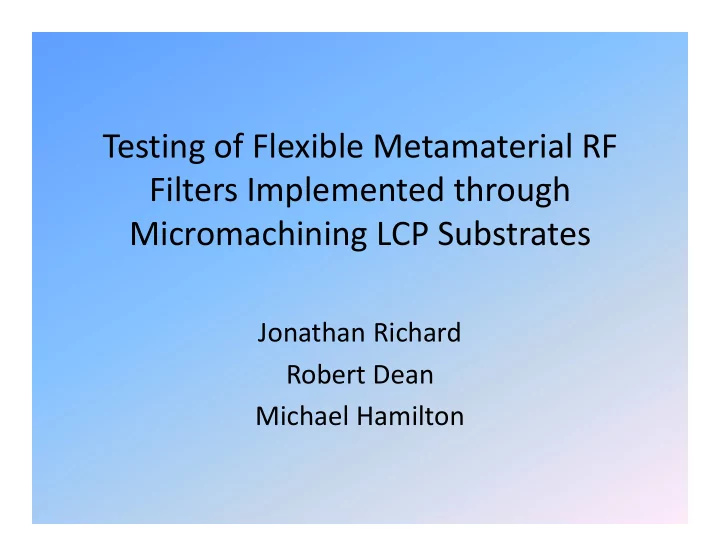

Testing of Flexible Metamaterial RF Filters Implemented through Micromachining LCP Substrates Jonathan Richard Robert Dean Michael Hamilton
Metamaterials Definition • Metamaterials exhibit interesting properties not readily observed in nature • These properties emerge due to specific interactions with electromagnetic fields or due to external electrical control.
Introduction to Metamaterials • Double Negative materials a.k.a. Left handed • Has negative index of refraction Use of specially built structures • • Special structures use normal materials such as Rogers board, LCP, and Polyimides.
Combining Technologies • Smaller feature size • More complex structures • Additional materials with useful properties • Rigid or flexible substrates Enhanced • Integrated electronics Devices Metamaterials MEMS
Common Uses • Mirrors and lenses • Transmission Lines Filters • Invisibility cloaks
Cloak Structure Physical Layout E ‐ field view with and without structure Note: Only works at small frequency range and for one type of EM wave (i.e. TE01)
Common Filter Structures • Split Ring Resonators (SRR) • Complementary Split Ring Resonators (CSRR) • Bandwidth is narrow • Must be electrically small for lumped element assumptions • Lumped element parameters derived from empirical data
CSRR Structure Lumped Element Representation Physical Layout • Cg = Gap Capacitance • Orange = ground plane • Lc and Cc represent the • White = etch off ground plane resonator as a tank circuit • Blue = metal on surface • L and C relate to the line per unit length
CSRR Gap Capacitance Effect No Gap – Band Stop Gap – Band Pass
Metamaterial Simulations Single Element • ADS Momentum uses method of moments • CSRR arrays constructed in ADS layout • Frequency sweep and calculate S ‐ parameters 10 Element Array
Simulation Results (10 Element Array) Expected bandpass filter response
LCP Fabrication Overview • Place mask on Liquid Crystal Polymer (LCP) with photolithography process • Copper etching techniques • LCP etching techniques
Photolithography Process • Inspect and clean substrate with HCl bath • Add HMDS to promote adhesion • Spin on photoresist • UV expose PR • Develop PR
Copper Etching • Before etching, cover opposite side with tape or photoresist since LCP comes double clad with copper • Wet etching is isotropic which is accounted for with photolithography mask • Slower wet etching causes less variance across the substrate • Therefore an LCP with thin Cu cladding is desirable
Copper Etching Continued Over etched CSRR etched transmission gap
LCP Etching • After copper has been fully removed where desired, E ‐ beam Al onto substrate • Add mask using photolithography process • Etch thin film Al mask with highly select etchant (PR developer) • Use O 2 RIE to remove LCP followed by chemical Al mask removal • Realizes holes and vias in metamaterials structures
Testing Procedure Setup • Since the T ‐ lines were impedance matched to 50 Ω , sma connectors could be easily connected • Provide extra T ‐ line on masks to help with soldering and providing more surface area between LCP and Cu • End Launch Connectors simplified testing and provided accurate results
Testing Procedure • Short/open/load procedure • Keep hands away from LCP and connectors during data capture to avoid stray capacitance • Elevate LCP into the air to avoid affecting fringing capacitance for air calibration • Test of flat PCB section • Use PVC pipe of various radii to perform flexibility tests
T ‐ Line Calibration Air calibration PVC calibration
Flexibility Testing • Multiple filters were flexed over 6 different sized pvc pipes • Tested with respect to T ‐ line orientation both up and down • Larger radii approached being flat Number 1 2 3 4 5 6 PVC Diameter 1/2" 3/4" 1" 1 1/4" 1 1/2" 2" Radius of Curvature in inches 0.542 0.65 0.804 0.984 1.115 1.3585
Testing Results 1/2" pvc pipe S21 • Expected bandpass 0 response observed -10 -20 • Slightly lower frequency -30 than simulation -40 • Flexing up or down had S21 (dB) -50 little effect on frequency -60 response S21 - Cal down -70 S21 - Cal up S21 - down 1 a • ½“ PVC pipe flex testing: -80 S21 - down 1 b S21 - up 1 a S21 - up 1 b -90 -100 10 12 14 16 18 20 22 Frequency (GHz)
Applications • Quality passive high order filters on flexible substrates – Wearable electronics – Flexible electronics • RF cloaking – Conformal to airfoils or vehicle bodies – Reduction of radar cross ‐ section – EMI/EMC improvement
Conclusions • RF metamaterials possess interesting and useful properties • Combining with MEMS technology enhances the usefulness of metamaterials • LCP is a flexible substrate material with excellent RF properties • RF metamaterials on flexible LCP substrates yield RF filters that can be conformably attached to nonplanar surfaces
Thanks
Recommend
More recommend